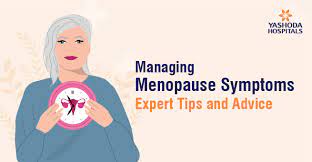I. Introduction
Menopause is a natural biological process marking the end of a woman’s reproductive years. As women age, they experience a series of physical and hormonal changes, leading to the cessation of menstrual cycles. Understanding menopause is crucial for women and their loved ones to navigate this transformative phase of life.
II. Signs and Symptoms
Physical Symptoms
Menopause brings about various physical changes, including hot flashes, night sweats, and changes in skin and hair. Understanding and managing these symptoms can greatly enhance the menopausal experience.
Emotional Symptoms
The hormonal fluctuations during menopause can contribute to mood swings, irritability, and anxiety. Recognizing and addressing these emotional symptoms is key to emotional well-being.
III. Causes of Menopause
Biological Factors
Menopause is primarily influenced by biological factors, including genetics and the aging process. Exploring these factors helps women comprehend the natural progression of menopause.
Hormonal Changes
Fluctuations in estrogen and progesterone levels play a significant role in menopause. Understanding the hormonal changes provides insights into the symptoms and the overall impact on the body.
IV. Stages of Menopause
Perimenopause
The transitional phase leading up to menopause involves irregular menstrual cycles and various symptoms. Recognizing perimenopause helps women prepare for the changes ahead.
Menopause
The official onset of menopause is marked by the absence of menstruation for 12 consecutive months. Embracing this stage empowers women to adapt to the new normal.
Postmenopause
Postmenopause refers to the years following menopause. Managing health during this phase is essential for long-term well-being.
V. Health Impacts
Bone Health
The decline in estrogen levels during menopause affects bone density. Prioritizing bone health through diet and exercise is crucial for preventing osteoporosis.
Cardiovascular Health
Menopause can influence cardiovascular health. Understanding the cardiovascular risks empowers women to adopt heart-healthy lifestyles.
VI. Managing Menopausal Symptoms
Lifestyle Changes
Incorporating healthy habits, such as regular exercise and a balanced diet, can alleviate menopausal symptoms and improve overall well-being.
Hormone Replacement Therapy (HRT)
HRT is an option for managing severe menopausal symptoms. A detailed discussion with healthcare professionals helps women make informed decisions.
VII. Mental Health During Menopause
Coping Strategies
Implementing coping strategies, such as mindfulness and stress management, supports mental well-being during menopause.
Seeking Support
Open communication with friends, family, and healthcare providers creates a support network that aids in navigating emotional challenges.
VIII. Impact on Relationships
Communicating with Partners
Effective communication with partners fosters understanding and support during the emotional and physical changes of menopause.
Relationship Dynamics
Menopause can impact relationship dynamics. Acknowledging and addressing these changes is vital for maintaining strong connections.
IX. Maintaining Sexual Health
Changes in Libido
Understanding the fluctuations in libido during menopause enables couples to adapt and maintain intimacy.
Addressing Intimacy Concerns
Addressing concerns related to intimacy fosters a healthy sexual relationship during and after menopause.
X. Nutrition and Exercise
Importance of a Balanced Diet
A balanced diet rich in nutrients supports overall health, especially during menopause. Nutritional choices can impact symptom severity.
Suitable Exercise Routines
Regular exercise contributes to physical and emotional well-being. Tailoring exercise routines to individual preferences ensures sustained fitness.
XI. Alternative Therapies
Herbal Supplements
Some women explore herbal supplements to manage menopausal symptoms. Understanding the potential benefits and risks is essential.
Acupuncture and Yoga
Complementary therapies like acupuncture and yoga offer holistic approaches to managing menopause symptoms.
XII. Menopause in the Workplace
Supportive Work Environments
Workplaces can contribute to positive menopause experiences by fostering supportive environments and understanding the needs of menopausal employees.
Employee Well-being Initiatives
Implementing well-being initiatives in the workplace, such as flexible schedules and awareness programs, supports employees during menopause.
XIII. Empowering Women through Knowledge
Education and Awareness
Empowering women with knowledge about menopause through education and awareness campaigns reduces stigma and fosters understanding.
Shaping a Positive Menopause Narrative
Promoting a positive narrative around menopause encourages women to embrace this phase of life with confidence and resilience.
XIV. Addressing Misconceptions
Common Myths about Menopause
Dispelling common myths about menopause challenges stereotypes and promotes accurate information.
Dispelling Stereotypes
Addressing stereotypes surrounding menopause helps create a more supportive and inclusive societal perspective.
XV. Conclusion
In conclusion, understanding and managing menopause is a journey of self-discovery and adaptation. Embracing the physical, emotional, and relational changes with a positive mindset enhances the overall menopausal experience. By empowering women with knowledge and debunking misconceptions, society can contribute to a more supportive and inclusive environment for women during this transformative phase of life.
FAQs (Frequently Asked Questions)
- Is menopause the same for every woman?
- No, menopause experiences vary among women due to factors such as genetics, lifestyle, and overall health.
- Can menopause impact mental health?
- Yes, hormonal changes during menopause can affect mental health, leading to mood swings and anxiety.
- What role does nutrition play in managing menopausal symptoms?
- A balanced diet rich in nutrients can help alleviate menopausal symptoms and support overall well-being.
- Is hormone replacement therapy suitable for everyone during menopause?
- HRT is a personal decision that should be discussed with healthcare professionals, considering individual health factors.
- How can workplaces support employees going through menopause?
- Supportive work environments, flexible policies, and awareness programs contribute to a positive experience for menopausal employees.
